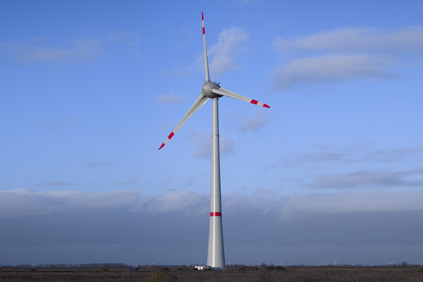Despite being a difficult year for turbine manufacturers, Enercon says it is satisfied with its performance in 2010. However, if there was one cloud it was the ongoing row with its Indian subsidiary Enercon India.
Enercon set up Enercon India in 1995, taking the majority 56% stake. Minority stakeholder, the Mehra family took the role of developing the Indian market for wind turbines while Enercon supplied the technological knowhow for its 800kW turbines. In the last business year, 2009/2010, 624 of the machines were produced.
Speaking about the arrangement Enercon, managing director Hans-Dieter Kettwig says: "Activities ran smoothly until about 2005 but then it became clear that the Indian management was following a different strategy and philosophy in the business to the German parent Enercon, which lays great store by sustainability and a long-term approach.
"Enercon had initially decided it made sense to buy out the Mehra family’s 44% share. But it made little headway and matters escalated from about 2007."
By 2008, Enercon "recognised that India is a difficult market for non-Indian companies" - indirectly suggesting that its own exit from Enercon India was now favoured - and has since been trying to reach an out-of-court settlement with the minority stakeholder. As part of these negotiations, the company has offered licensing contracts to Enercon India, "but without success since these contracts are currently not being accepted", Kettwig says.
In June 2009, three Enercon managers were imprisoned and only released with the aid of the German embassy in India.
In the meantime, the court cases are continuing as Enercon "tries to get clarity over the situation at Enercon India". Enercon has never drawn a dividend from its business in India. "Returns on investment have always been fully reinvested in Enercon India," Kettwig noted.
Enercon is also pursuing the Mehra family and its companies through the courts over the claimed flouting of its patents. For its part, the Mehra family has lodged its own legal claims and counter-claims against Enercon.
Most recently, a legal plea by Enercon’s owner Aloys Wobben to stop Yogesh Mehra and others from pressing an application to revoke four Enercon patents in India was not upheld. The ruling was handed down in a judgement by the High Court of Delhi on December 6.
The matter is complicated by political discussion in India over whether green technologies, including wind power, are "a public good" and therefore should be subject to the so-called Compulsory Licence regime.
The WTO’s ‘Agreement on Trade-Related Aspects of International Property Rights’ allows Compulsory Licences if this serves the public interest. A government can compel a patent holder to licence use or manufacture of its invention, the fees being subject to government discretion, if negotiations over a voluntary licence agreement fail.
"As a consequence, the licensor, often foreign, may not be able to make its patents available at the prices that it wants or must have due to economic considerations," the state-owned foreign trade company German Trade and Invest told WPM.
Despite an upbeat view of its 2010 performance as a whole, Enercon’s performance was not quite as successful as management had hoped. It has installed just under 3GW of capacity, somewhat less than the 3.3GW its intends for 2011.
"The weather god was not on our side. The cold weather in January to March and in December set projects back," says Kettwig. Of total installations in 2010, 850-900MW was in Germany, 420MW in France, 350MW in Portugal, 125MW in Sweden, and the remaining nearly 1.8GW elsewhere around the world. Looking ahead, Enercon expects to install about 3.2GW next year, on a par with the 2009 figure.
Despite the continuing financial squeeze in the wake of the banking and economic crisis that began in 2008, "Enercon suffered no financial losses in Germany or internationally in 2010, although in some southern countries there were discussions about how payments should be made," says Kettwig.
Enercon was anticipating a turnover of €3.5 billion in 2010, "but we’ll be a little below, at €3.3-€3.4 billion," Kettwig says. The company says it refuses to be driven by the market. Competitors may have production overcapacity and offer price rebates but Kettiwig stressed Enercon "wants to stay healthy to be able to serve its customers into the long term, and for that we must be profitable. There is a positive market for wind turbines, there is no need to overreact."
Enercon sees potential in the Spanish market, particularly in replacement of old wind turbines, and opened an office in Madrid in December. It also has its eye on the UK market and will open an office in Scotland in early 2011.
In 2011 and 2012 the emphasis will be on introducing the 3MW turbine with 101 metre rotor diameter to the market. Investment is to be made in new semi-automated production facilities in Aurich, Emsland and Magdeburg.
Enercon plans to build only 10-15 of its mighty 7.5MW machines in 2011. "We are not yet in series production. There is not a mass market for large turbines but some customers such as energy companies want to have the big machine – after all, it’s a demonstration that a wind turbine is a power station," Kettwig says.
In particular, municipal utilities currently planning to invest in new electricity generation plants are showing interest. The three 7.5MW machines installed near Enercon’s headquarters in Aurich produce an amount of electricity equivalent to the needs of the town, Kettwig pointed out. From 2014-15 production numbers of the 7.5MW machine will be stepped up to coincide with a wave of turbine replacement in Germany.
One area Enercon will not be moving into is offshore. Kettwig says there is a large onshore wind market around the world and the company plans to devote its energies to servicing it.

.png)



.png)









